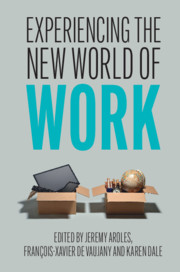Book contents
- Experiencing the New World of Work
- Experiencing the New World of Work
- Copyright page
- Contents
- Tables
- Contributors
- Foreword
- Introduction
- Part I Experiencing at Work
- Part II Digital Platforms and the New World of Work
- 5 Exploring Inequalities in Platform-Based Legal Work
- 6 Workers Inquiry and the Experience of Work
- 7 Digital Nomads
- Part III Politics, Imaginaries and Others in the New World of Work
- Conclusion
- Afterword
- Index
- References
6 - Workers Inquiry and the Experience of Work
Using Ethnographic Accounts of the Gig Economy
from Part II - Digital Platforms and the New World of Work
Published online by Cambridge University Press: 24 December 2020
- Experiencing the New World of Work
- Experiencing the New World of Work
- Copyright page
- Contents
- Tables
- Contributors
- Foreword
- Introduction
- Part I Experiencing at Work
- Part II Digital Platforms and the New World of Work
- 5 Exploring Inequalities in Platform-Based Legal Work
- 6 Workers Inquiry and the Experience of Work
- 7 Digital Nomads
- Part III Politics, Imaginaries and Others in the New World of Work
- Conclusion
- Afterword
- Index
- References
Summary
The chapter considers how research that puts the workers' perspective at the forefront can be placed within a critical dialogue with the researcher. While there have been accounts of resistance taking place across Europe in delivery platforms, these have tended to take a broader analytical lens, rather than focusing on the specific practices being experimented with. In this chapter, the author presents a reflection on the experiences of joint writing with workers in the gig economy. This involves analysing attempts to use methods of co-research inspired by the workers-inquiry method, building on previous accounts. The chapter is intended as a corrective to much of the abstract academic research on the 'gig economy'. As such it is both an empirical and methodological intervention – presenting an account of this work from the perspective of a worker themselves, while also arguing that it is from this perspective that the work can be not only critically analysed but also transformed.
- Type
- Chapter
- Information
- Experiencing the New World of Work , pp. 136 - 156Publisher: Cambridge University PressPrint publication year: 2021
References
- 1
- Cited by



